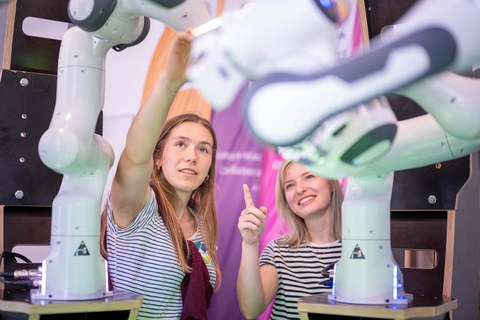Jul 02, 2025
Research-Based Teaching at the Clusters of Excellence
ct.qmat: Complexity and Topology in Quantum Materials
The ct.qmat Cluster of Excellence adds an innovative, forward-looking focal point to physics teaching at the Universities of Würzburg and Dresden: topology. Inter-regional events and teaching with direct links to top-level research have created a unique environment for students. ct.qmat offers these budding academics research-centered training in physics at the highest international level. The topics covered include photonics, superconductivity, frustrated magnetism and quantum sensors. Most of the lectures are delivered by the professors and junior research group leaders. Postdocs give seminars, take on teaching events and help supervise student theses, while doctoral students act as tutors. This results in active knowledge transfer on every level.
Find out more at https://www.ctqmat.de
PoL: Physics of Life
Together, the CMCB and the PoL Cluster of Excellence have introduced a new “Physics of Life” Master’s program. This provides the fundemental knowledge required to understand the physical principles that enable material to come to life and form organisms. The program combines practical lab exercises, theoretical lectures and programming practice, giving students first-hand research experience at the touchpoint of physics, biology, chemistry and computer science. Principal Investigators (PIs) from PoL are also involved in teaching on other CMCB programs, at the Faculties of Biology and Physics, and at Summer Schools, offering a unique perspective by examining current biological issues through the lens of physics.
Find out more at https://physics-of-life.tu-dresden.de/
CeTI: Centre for Tactile Internet with Human-in-the-Loop
The research taking place at CeTI makes its way not only into teaching at the Deutsche Telekom Chair of Communication Networks (ComNets) but also, thanks to the Principal Investigators’ interdisciplinary expertise, into other disciplines, including psychology, medicine or mechanical engineering. There is close cooperation with various professors, who integrate CeTI research into their teaching, especially on topics such as the Tactile Internet and the collaborative Human-in-the-Loop approach. Professors, postdocs and doctoral students take on a variety of tasks in this context, putting together lectures and seminars and supervising theses. One concrete example is the Electrical Engineering program’s lecture on the basic principles of software engineering and microcomputer technology, which sees CeTI and the ComNet chair working together directly. All the students receive a Raspberry Pi Pico; a microcontroller that offers them an individual, practically relevant introduction to programming as soon as they start their studies.
Find out more at https://ceti.one

